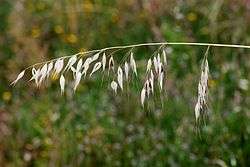avea
Galician

avea
Etymology
From Old Portuguese avẽa, from Latin avēna (“oats”). Cognate with Portuguese aveia and Spanish avena.
Pronunciation
- IPA(key): /aˈβea̝/
Noun
avea f (plural aveas)
- oat
- 1331, Antonio López Ferreiro (ed.), Fueros municipales de Santiago y de su tierra. Madrid: Ediciones Castilla, page 542:
- de quanto centeo e auea e orjo labraren en ese Regengo ha de auer o arcobispo ou seu mayordomo a meadad despois que os labradores tomaren o seu dereito
- of all the rye, oat and barley that they would grow in this crown's possession, the archbishop or his steward must have half of it, after the laborers have taken their parts
- de quanto centeo e auea e orjo labraren en ese Regengo ha de auer o arcobispo ou seu mayordomo a meadad despois que os labradores tomaren o seu dereito
- 1409, José Luis Pensado Tomé (ed.), Tratado de Albeitaria. Santiago de Compostela: Centro Ramón Piñeiro, page 61:
- Jtem. deue o potro comer feo, palla, herua, orio, auea, espelqa, que quer dizer melga, et as qousas semellauelles a esto, que naturalmente som para seu comer.
- Item. The foal must eat hay, straw, grass, barley, oat, spelt —that is, melga— and things that are similar to these, which are naturally for them to eat
- Jtem. deue o potro comer feo, palla, herua, orio, auea, espelqa, que quer dizer melga, et as qousas semellauelles a esto, que naturalmente som para seu comer.
- 1331, Antonio López Ferreiro (ed.), Fueros municipales de Santiago y de su tierra. Madrid: Ediciones Castilla, page 542:
Derived terms
- aveal
- Aveal
References
- “auea” in Dicionario de Dicionarios do galego medieval, SLI - ILGA 2006-2012.
- “auea” in Xavier Varela Barreiro & Xavier Gómez Guinovart: Corpus Xelmírez - Corpus lingüístico da Galicia medieval. SLI / Grupo TALG / ILG, 2006-2016.
- “avea” in Dicionario de Dicionarios da lingua galega, SLI - ILGA 2006-2013.
- “avea” in Tesouro informatizado da lingua galega. Santiago: ILG.
- “avea” in Álvarez, Rosario (coord.): Tesouro do léxico patrimonial galego e portugués, Santiago de Compostela: Instituto da Lingua Galega.
Romanian
Etymology
From Latin habeō (“have, hold, possess”), probably from a Proto-Italic *habēō or *haβēō, possibly ultimately from Proto-Indo-European *gʰh₁bʰ- (“to grab, to take”).
Pronunciation
- IPA(key): /aˈve̯a/
Verb
a avea (third-person singular present are, past participle avut) 2nd conj.
- (transitive) to have
- (reflexive, accusative, often with cu) to stand
- (auxiliary) Used to form other tenses.
- Used with past participles to form the compound perfect tense.: to have (done)
- Used with a subjunctive to form a variant of the future tense.
- Am să te vizitez odată.
- I will visit you sometime.
- Used with an infinitive to form the conditional present tense.
- Aș face-o dacă aș putea.
- I would do it if I could.
- Used with fi and a past participle to form the conditional perfect tense.
- Aș fi venit dacă aș fi avut timp.
- I would have come if I had time.
- Used with past participles to form the compound perfect tense.: to have (done)
Usage notes
- The verb avea has three conjugations, shown below: one when used as a full verb or to form the future tense (el/ea are), one when forming the compound perfect tense (el/ea a) and one when forming the conditional present and past tenses (el/ea ar).
Conjugation
conjugation of avea (second conjugation, past participle in -ut)
| infinitive | a avea | ||||||
|---|---|---|---|---|---|---|---|
| gerund | având | ||||||
| past participle | avut | ||||||
| number | singular | plural | |||||
| person | 1st person | 2nd person | 3rd person | 1st person | 2nd person | 3rd person | |
| indicative | eu | tu | el/ea | noi | voi | ei/ele | |
| present | am | ai | are | avem | aveți | au | |
| imperfect | aveam | aveai | avea | aveam | aveați | aveau | |
| simple perfect | avui | avuși | avu | avurăm | avurăți | avură | |
| pluperfect | avusem | avuseși | avuse | avuserăm | avuserăți | avuseră | |
| subjunctive | eu | tu | el/ea | noi | voi | ei/ele | |
| present | să am | să ai | să aibă | să avem | să aveți | să aibă | |
| imperative | — | tu | — | — | voi | — | |
| affirmative | ai | aveți | |||||
| negative | nu avea | nu aveți | |||||
This article is issued from
Wiktionary.
The text is licensed under Creative
Commons - Attribution - Sharealike.
Additional terms may apply for the media files.